Hope this article doesn’t find you buried under 247 unread emails.
If you’re like most founders and marketers, your inbox should be endless, campaigns linger half-finished, and every “quick reply” spirals into another lost hour.
The truth is, email drives sales, but it also drains focus. Automations cover the basics, yet personalization, follow-ups, and keeping your tone consistent still demand too much manual work.
AI email assistants offer a way out. Not with overblown promises about replacing you, but with practical tools that trim the busywork, sharpen personalization, and keep campaigns running while you get back to growth.
In this guide, we’ll explore the top assistants worth your attention, compare their strengths, and show you how to choose the one that actually fits your workflow and budget.
Hit send!
[[cta5]]
What AI Email Assistants Actually Do
Think of AI email assistants less like magic robots and more like smart sidekicks. Their job is to handle the repetitive stuff that keeps you from doing real work.
That means things like
- drafting replies so you don’t start from scratch,
- keeping your tone consistent across campaigns,
- suggesting subject lines that actually get opened,
- or organizing your inbox so you know what needs attention first.
Some assistants lean toward inbox cleanup, others toward marketing automation, and a few blend both.
The point is to give you back time while making your email strategy more consistent, more scalable, and less of a daily grind.
Benefits & Drawbacks of AI Email Assistants
AI email assistants sound like a dream, and in many ways they are. But like every tool, they come with strengths and limitations you’ll want to know before diving in.
Benefits
- Time savings: Drafts, subject lines, and responses appear in seconds. Studies show AI email assistants can save you over 3 hours weekly by automating repetitive tasks like drafting, sorting, and scheduling. These tools boost productivity by up to 40%, freeing you to focus on more meaningful work.
- Consistency: Helps maintain brand voice across campaigns, even when multiple people are writing.
- Personalization at scale: AI can pull in data like past purchases or behaviors to make emails feel tailored.
- Inbox management: Some tools sort and prioritize messages so you don’t miss what matters.
- 24/7 availability: Campaigns and replies keep moving even when you log off.
- Cost efficiency: Cheaper than hiring an extra person for repetitive tasks.
Drawbacks
- Context blind spots: AI can misinterpret tone or intent, especially in sensitive situations.
- Generic outputs: Without guidance, some responses feel robotic or templated.
- Integration limits: Certain assistants only work with specific platforms (Shopify, Outlook, etc.).
- Scaling costs: Usage-based or per-contact pricing can add up quickly as you grow.
- Privacy concerns: Some tools process data externally, raising compliance questions.
- Overreliance risk: Rely too much, and your emails may start losing authenticity.
AI Email Assistants Compared at a Glance
Top 8 AI Email Assistants in 2025
There’s no shortage of AI tools promising to “fix” your email. Instead of wading through endless options, we’ve shortlisted the assistants worth your time in 2025.
Some of these are built as lightweight inbox companions, while others double as AI tools for ecommerce, boosting revenue through smarter personalization and automated support.
For each tool, you’ll see what it’s best at, who it’s for, the key features, pros and cons, pricing, and integrations. That way you can quickly spot which one actually fits your workflow and budget without testing a dozen free trials first.
1. Superhuman
Best for: Power users who want the fastest possible inbox experience.

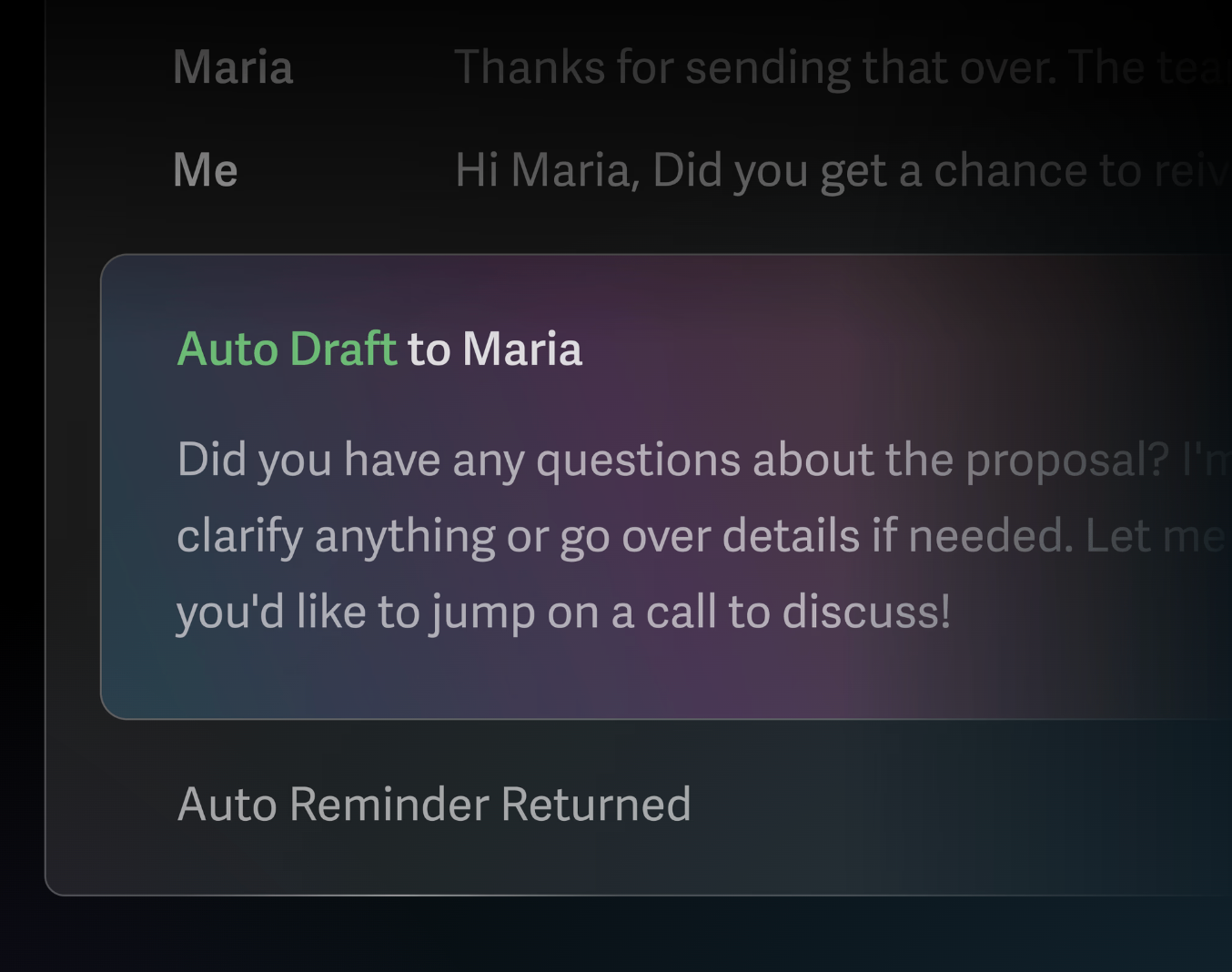
Superhuman is an email client built for speed. Its signature strength is keyboard shortcuts that let you fly through your inbox and reach “inbox zero” up to four times faster than traditional clients.
Features like reminders, email scheduling, and split inboxes keep you focused. The newer AI additions can summarize long threads, suggest replies, and help draft emails in your tone. It also includes “undo send” and follow-up nudges, so nothing slips through the cracks.
Pros
- Lightning-fast workflow with hotkeys and shortcuts
- Clean, minimalist design optimized for productivity
- AI features save time on replies and summaries
- Strong tools for focus (snooze, split inbox, reminders)
Cons
- Steep learning curve if you’re not comfortable with shortcuts
- Pricing is high compared to other email clients
- Works only with Gmail and Outlook (no universal IMAP/POP support)
- Privacy concerns have been raised in the past
Pricing
- Starter: $30/user/month - includes Superhuman AI, email productivity tools, collaboration features, and coaching
- Business: $40/user/month - everything in Starter plus advanced AI (auto drafts, Ask AI, custom auto labels), HubSpot & Salesforce, recent opens
- Enterprise: Custom pricing - advanced security, dedicated success manager, analytics, VIP support
Integrations
Works with Gmail and Outlook, plus integrations with Google Calendar, Zoom, and task managers.
2. Microsoft Copilot
Best for: Teams already in the Microsoft 365 ecosystem who want AI directly inside Outlook to manage and improve email workflows.
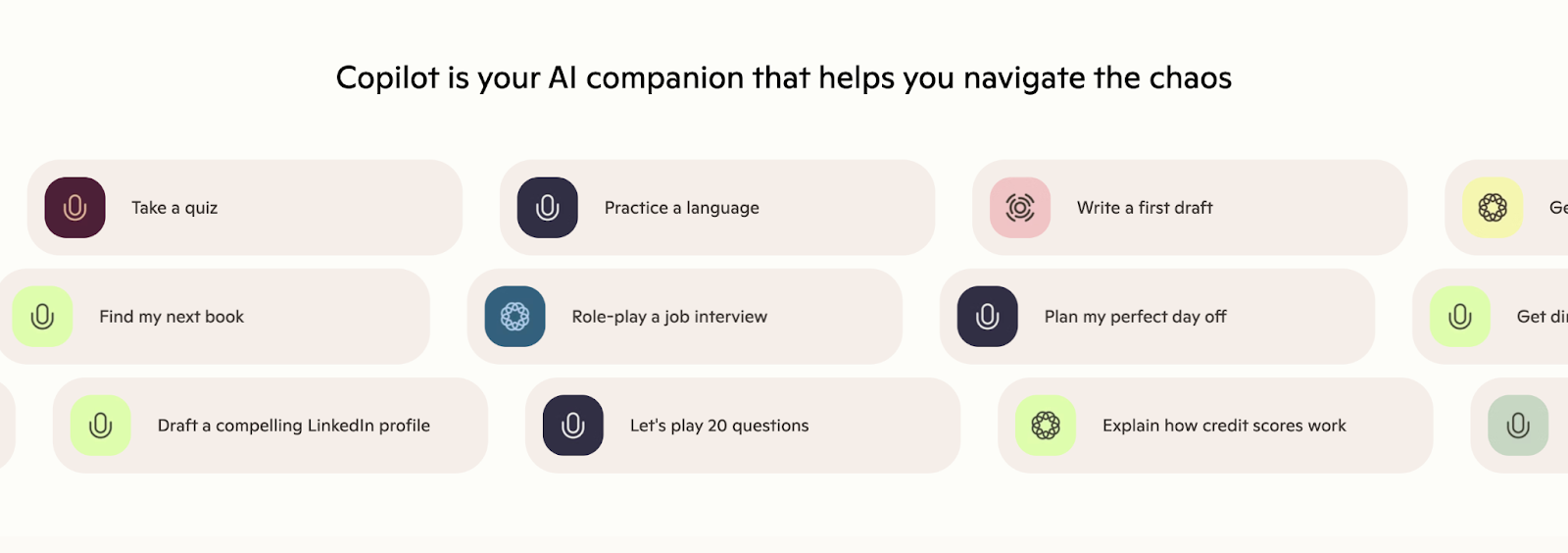
Copilot lives inside Microsoft 365, but where it really shines for email is Outlook.
It can summarize sprawling email threads so you don’t waste time scrolling, draft replies in your tone, and even coach you on clarity, sentiment, and professionalism before you hit send.
For follow-ups and scheduling, Copilot draws on Microsoft Graph to pull context from your emails, calendar, and documents, so replies feel relevant without you hunting for links or files.
And because it’s built into Outlook itself, there’s no extra setup. It works where you already spend your day.
Pros
- Native to Outlook, no switching tools or extensions
- Summarizes long threads and flags key points instantly
- Drafts and refines replies in your own tone
- Coaching on clarity and sentiment improves professionalism
- Enterprise-ready with compliance, governance, and security baked in
Cons
- Pricey at $30/user/month, with some plans requiring 300+ seats
- Accuracy can vary, with drafts sometimes needing edits
- Works best if you’re fully in the Microsoft ecosystem
- Learning curve for prompt precision and maximizing value
Pricing
- Microsoft 365 Copilot Add-On: $30/user/month, on top of an existing Microsoft 365 E3, E5, Business Standard, or Business Premium license.
- Enterprise licensing models available, with a 300-user minimum for some tiers.
- Free consumer version of Copilot available in Windows, but it’s not as powerful as the business-grade edition.
Integration
Works natively in Outlook and syncs with other Microsoft 365 apps (Word, Excel, PowerPoint, Teams, OneNote, Loop) for contextual replies. Pulls data from Microsoft Graph and SharePoint to personalize email drafting and summaries.
3. Gmail Gemini
Best for: Google Workspace or Gmail users who want AI assistance baked directly into their inbox.
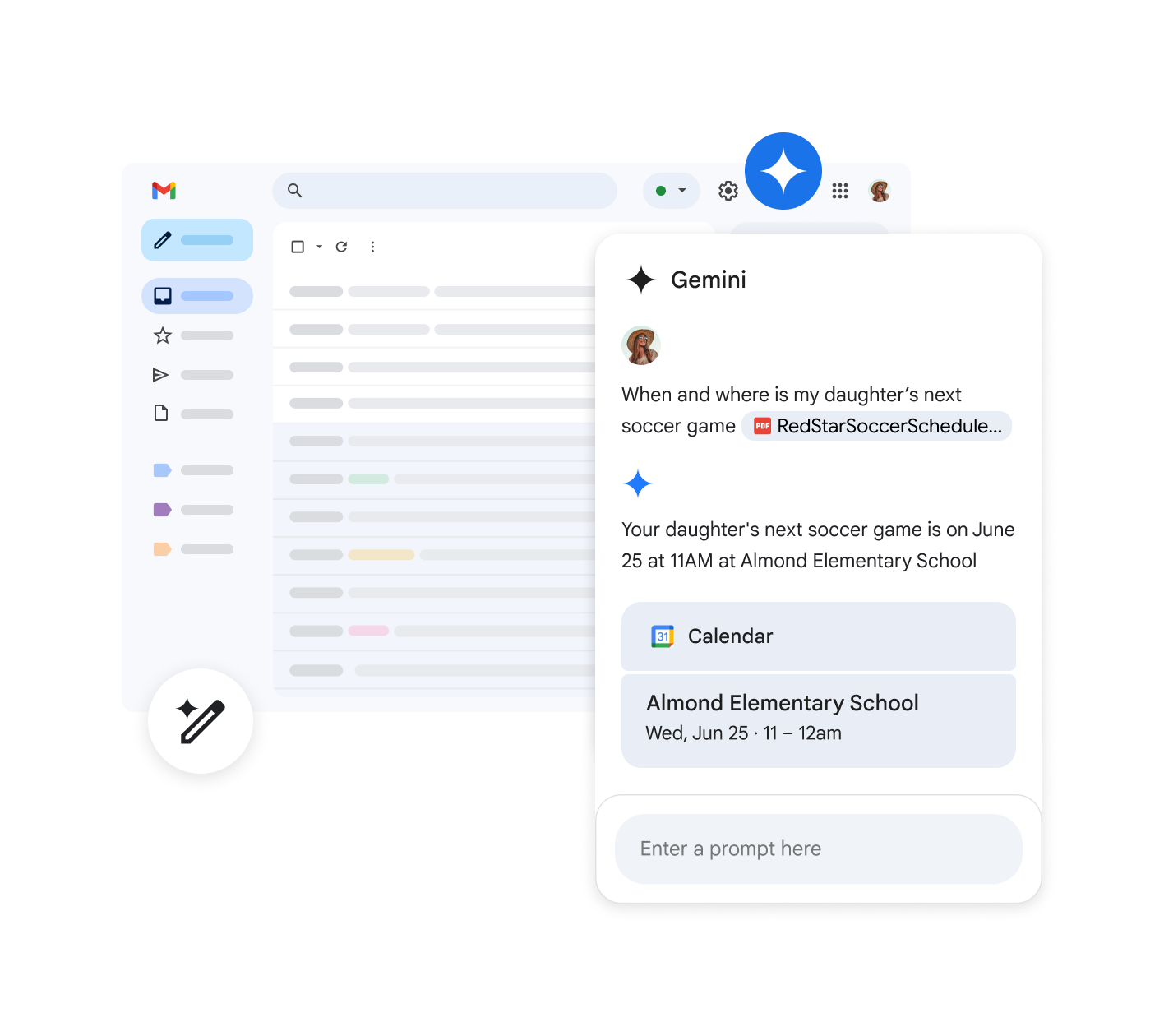
Gemini is integrated into Gmail for both Workspace and Google One Premium users. It can summarize long threads so you don’t have to scroll endlessly, draft new emails from prompts, or refine existing drafts with options like “formalize,” “shorten,” or “elaborate.”
It also suggests quick replies based on context and can pull information from across Google apps (Drive, Calendar, Docs) when the Workspace extension is enabled.
On desktop, it lives in the sidebar, while on mobile, it’s accessed through the Gemini icon in the Gmail app.
Pros
- Native Gmail integration with no extra setup
- Handy for summarizing long email threads
- Strong drafting/refining options (“Help me write”)
- Cross-app context from Google Workspace (Calendar, Drive, Docs)
- Included with Google Workspace subscriptions
Cons
- Mixed accuracy; summaries can miss nuance
- Some users find features intrusive or hard to disable
- Less powerful than standalone AI writing assistants
- Limited customization compared to tools like Superhuman or Copilot
Pricing
- Included with all Google Workspace plans (Business Starter, Standard, Plus, Enterprise).
- Also available to personal Gmail users with a Google One Premium plan (2TB+).
- Early access sometimes offered through Workspace Labs.
Integrations
Fully native to Gmail and Google Workspace. Works seamlessly with Google Calendar, Drive, Docs, and Meet.
4. MailMaestro
Best for: Professionals and teams who want an AI-powered assistant directly inside Outlook or Gmail to speed up writing, replies, and inbox management.
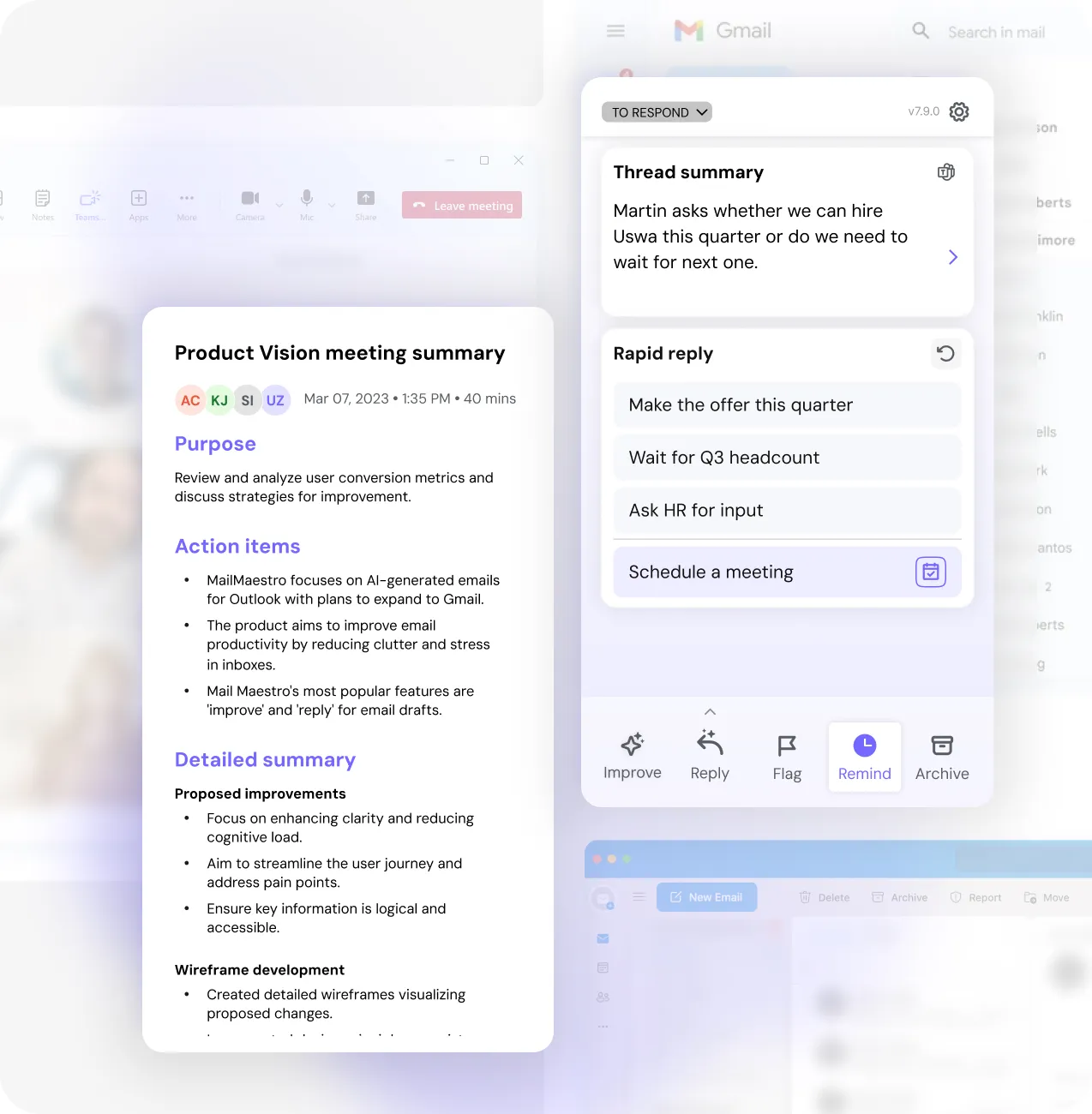
MailMaestro focuses on making email faster and less stressful without feeling bloated.
It can draft new emails, suggest replies, refine text, and summarize long threads or attachments. Extra touches include an AI-powered priority inbox, reminders, and smart meeting scheduling (exclusive to Outlook).
Teams get added features like shared templates, dashboards, and enterprise-grade security. The platform works natively in Gmail and Outlook, with strong ratings from users in both ecosystems.
Pros
- Integrated directly into Outlook and Gmail (no learning curve)
- Strong summarization tools for emails and attachments
- Templates and AI personality keep tone consistent
- Affordable entry point compared to other AI clients
- Well-suited for both individuals and teams (55k+ teams already use it)
Cons
- Priority inbox and reminders only available for Outlook
- AI requests limited in the free plan (3 per week)
- Not as advanced for full marketing automation as Klaviyo or Omnisend
- Some advanced security and integrations locked behind Enterprise
Pricing
- Free: $0 - 3 AI requests per week, basic drafting and reply features
- Professional: $15/user/month - email summaries, smart scheduling, reminders, priority inbox
- Team: $15/user/month - adds shared templates, team dashboard, enterprise security
- Enterprise: Custom pricing - advanced security, onboarding, support, custom integrations
Integrations
Native with Outlook and Gmail. Also connects to Microsoft Teams for shared templates and email sharing.
5. Compose AI
Best for: Anyone who spends a lot of time in Gmail and wants faster drafting, replies, and smarter autocomplete without switching apps.
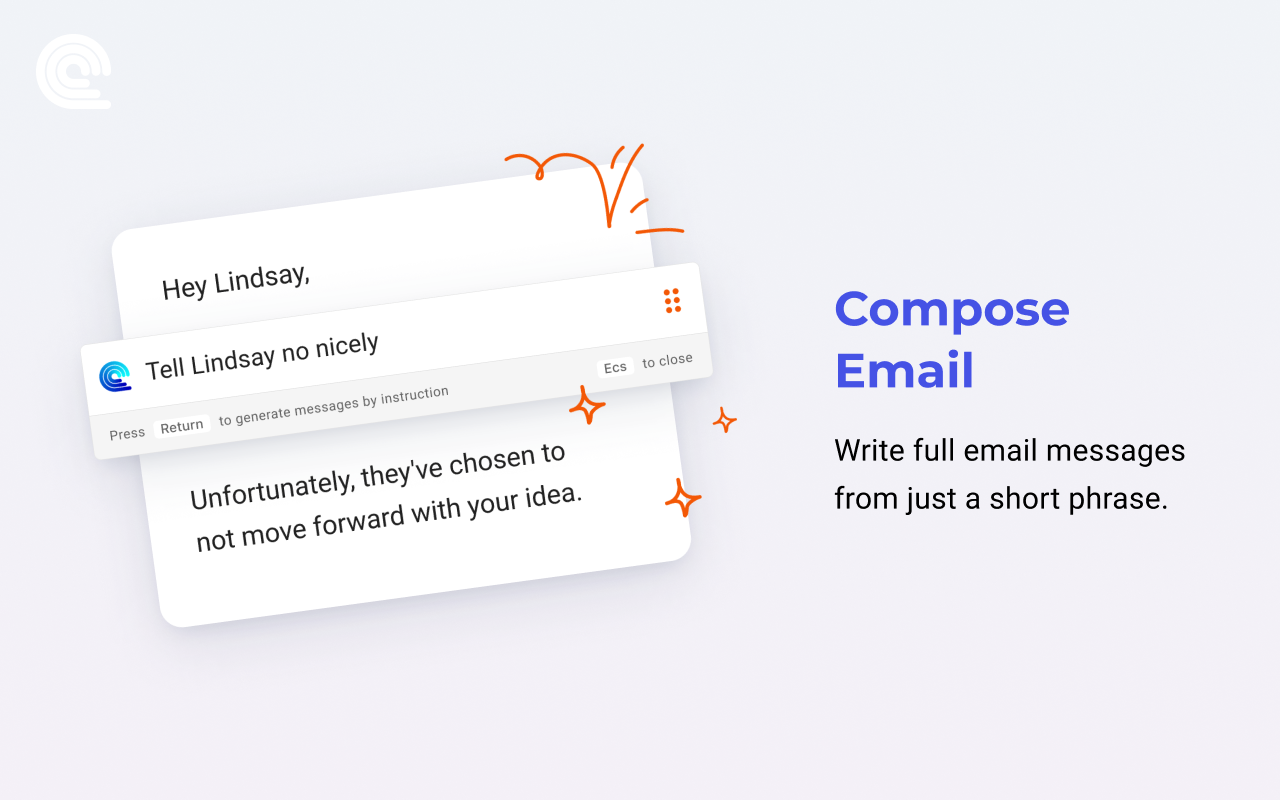
Compose AI works as a browser extension that plugs directly into Gmail.
It speeds up email workflows with advanced autocomplete, one-click full replies, and quick drafting using simple prompts (//). You can also rephrase, shorten, or expand existing emails to match tone or length, making it easier to adjust your style without rewriting from scratch.
Compared to heavier email clients, Compose AI is lightweight and focuses entirely on making your inbox faster and smoother to handle.
Pros
- Seamless Gmail integration, no new platform to learn
- One-click email replies save serious time on routine responses
- Strong autocomplete suggestions as you type
- Rephrase and tone tools make emails more polished instantly
- Affordable and accessible compared to full AI clients like Superhuman
Cons
- Limited free plan (only a few replies and rephrases per month)
- Output can feel generic, often requiring edits
- Not built for larger teams or CRM-level automation
- Lacks deeper inbox management features (sorting, reminders, analytics)
Pricing
- Free: 1,500 words/month, 10 AI replies, 25 rephrases
- Premium: $14.99/month - 25,000 words, unlimited rephrases, 50 replies, unlimited autocomplete
- Ultimate: $44.99/month - unlimited words, replies, and autocomplete
- Enterprise: Custom pricing with discounts for teams
Integrations
Browser extension works across Gmail, LinkedIn, Docs, and most web-based apps. No deep platform integrations like CRM or ESP.
6. Rep AI
Best for: Shopify sellers and busy professionals who want an AI agent that handles both customer emails and on-site support to recover sales and reduce inbox overload.
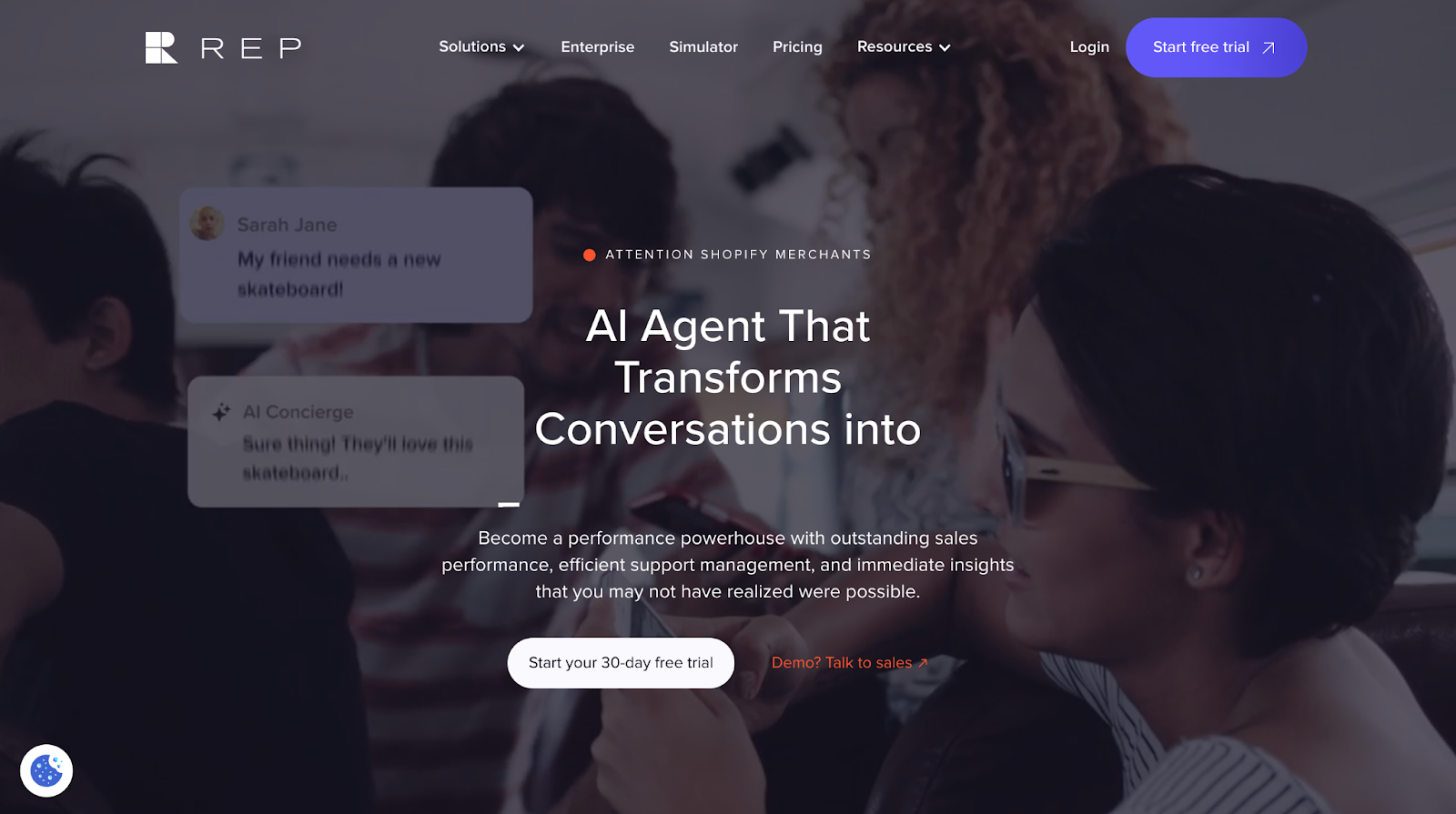
Rep AI positions itself as an AI-powered email and chat assistant.
On the email side, it filters messages into categories like Reply now, Important, Read later, and Not needed, helping you prioritize what matters. It can also draft automated replies for common requests, such as shipping updates, scheduling calls, or FAQs, so you don’t have to start from scratch every time.
On the sales side, Rep AI works as a conversational agent for your Shopify store: it answers product questions, recommends items, helps shoppers complete checkout, and sends personalized abandoned-cart emails.
Together, these features make it both an inbox declutter tool and a revenue driver.
Pros
- Dual focus: inbox management + ecommerce sales support
- Auto-categorizes emails for faster triage
- Generates draft replies based on past conversations and FAQs
- Can recover abandoned carts and upsell directly through chat or email
- Works 24/7 without human oversight
- Mobile-native, no extra apps required
Cons
- Currently optimized for Gmail only (Outlook support coming soon)
- Designed around Shopify, so less useful for non-commerce users
- Pricing scales with traffic and usage, which can get expensive for larger stores
- As with all inbox AI, trust is key: risk of missing or mishandling important emails if unchecked
Pricing
Rep AI follows a “pay as you grow” model, with plans based on monthly visitors and catalog size:
- AI Sales Assistant: $12 per 1,000 monthly visitors
- AI Support Agent: $19 per month
- AI Concierge (Bundle: Sales + Support): $46 per month
- Enterprise add-ons: $200 for advanced customization, dedicated support, and policy training
All plans include unlimited seats, tone-of-voice customization, live chat, proactive sales features, and analytics.
Integrations
Built primarily for Shopify. Connects with Gmail (Outlook in progress), helpdesk tools like Gorgias and Zendesk, and marketing platforms such as Klaviyo and Mailchimp. Future roadmap includes Slack, SMS, and WhatsApp digests.
7. Gorgias AI Agent
Best for: Ecommerce teams using Gorgias who want AI to handle customer emails, especially routine queries like order status or returns, while still allowing humans to manage exceptions.
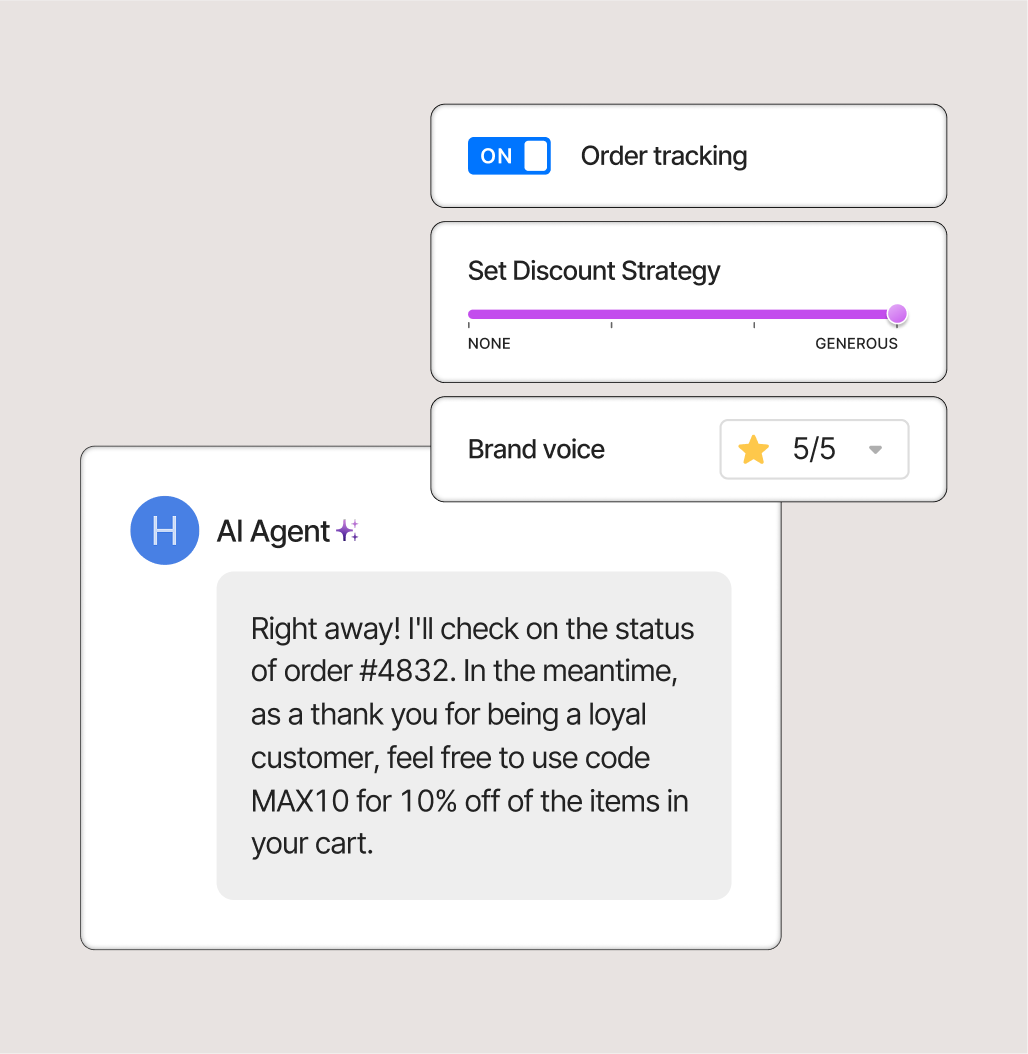
As an add-on to the Gorgias helpdesk, the AI Agent automates around 60% of support emails by generating responses grounded in real customer and order data, then either resolving them instantly or drafting replies for review.
It seamlessly works across channels and learns your brand tone and policies via uploaded SOPs and feedback loops. Analytics lets you monitor resolution rates, sentiment, and revenue impact in real-time.
Powerful if you’re already on the Shopify-focused Gorgias ecosystem, where AI can resolve routine support tickets while also fueling smarter Shopify email marketing flows like post-purchase updates, shipping notifications, and loyalty nudges.
Pros
- Resolves a large share of repetitive support emails automatically
- Accuracy improved via brand-guided norms and integrated data sources
- Offers analytics and feedback mechanisms to refine AI performance over time
- Powerful if you're already on the Shopify‑focused Gorgias ecosystem
Cons
- Each automated resolution costs extra $0.90/monthly or $0.90 (annual) per item. Each also counts as a billable helpdesk ticket
- Pricing complexity: you’re billed for both the helpdesk capacity and AI resolution, so cost can climb as automation increases
- Requires Gorgias helpdesk subscription, so not a standalone tool; also best suited to Shopify-centric retailers
Pricing
- ~$0.90 per fully automated resolution (monthly plans) or ~$0.90 (annual)
Integrations
Bolts into Gorgias and works across Shopify, BigCommerce, Magento, plus 100+ apps like Klaviyo. Automated workflows can include upsells, refunds, and other live actions directly in responses.
8. Clerk.io
Best for: Mid-size to large ecommerce stores that want hyper-personalized email campaigns without building complex segments manually.
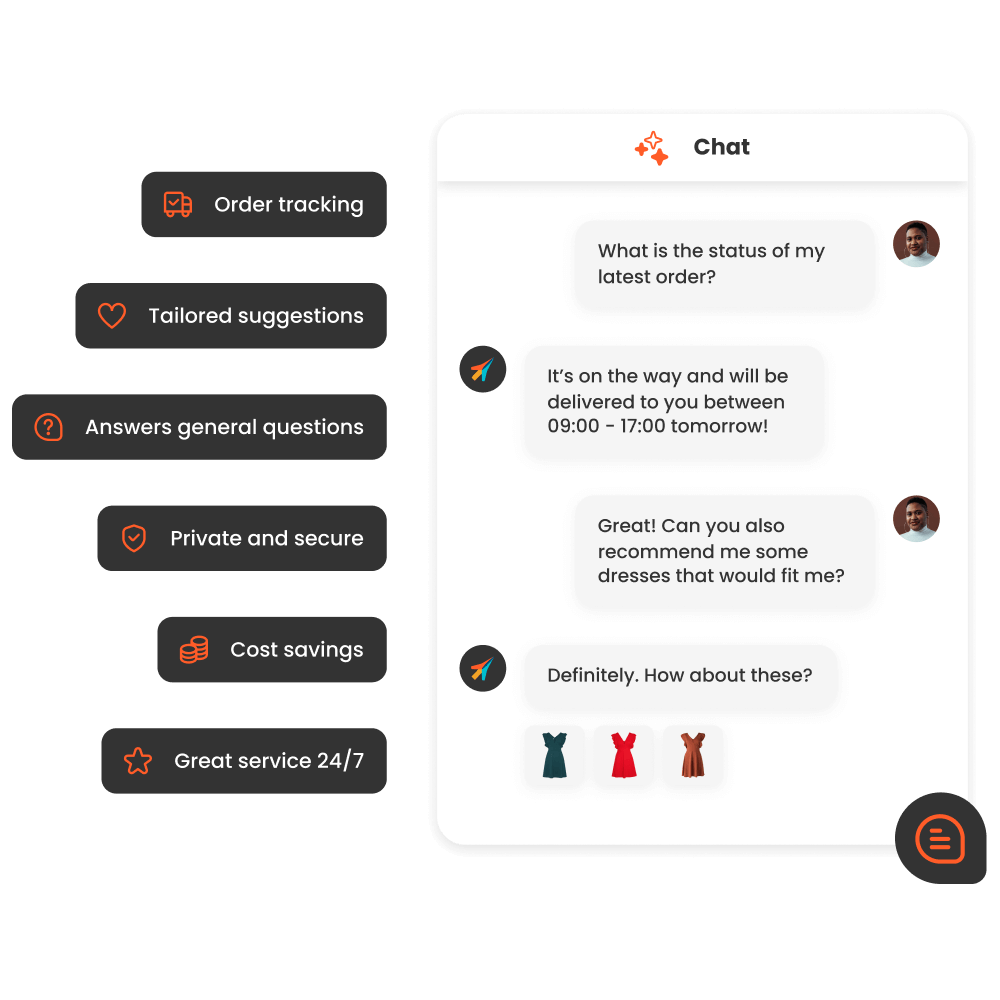
Clerk.io is an AI personalization engine that can run your email marketing almost on autopilot.
Its “Auto Email” feature automatically decides who to send to, when to send, and what content to include, based on each customer’s purchase history and behavior.
It pulls product recommendations straight from your catalog and inserts them dynamically into emails, so every customer sees something different.
Unlike rule-based automation, Clerk.io continuously learns from transactions, making each campaign smarter over time. Think of it as powering some of the strongest email marketing examples in ecommerce: product recommendations that feel hand-picked, perfectly timed restock alerts, and tailored offers that keep customers coming back.
Pros
- Sends highly personalized, perfectly timed product emails
- Works with your existing email provider (e.g., Klaviyo, Mailchimp)
- Privacy-friendly, cookie-free personalization based on real purchase data
- Automates segmentation without manual “if-then” setups
- Proven lift in repeat purchases and average order value
Cons
- More technical setup than plug-and-play tools
- Designed for businesses with larger datasets (may feel like overkill for very small shops)
- Usage-based pricing can add up at high email volumes
Pricing
Clerk.io uses usage-based pricing. You pay per personalized email sent and per product recommendation displayed. There’s no fixed monthly fee, and no commission on sales, but larger stores with high volumes should budget accordingly. Exact rates are provided on request via Clerk.io’s pricing page.
Integrations
Works with Shopify, Shopify Plus, Magento, BigCommerce, and WooCommerce. Also integrates into ESPs like Klaviyo, Mailchimp, and ActiveCampaign via product recommendation blocks or full Auto Email campaigns.
How to Select the Best AI Email Assistant for Your Needs
At this point, you’ve seen the options. But which AI assistant actually makes sense for you? Here’s a simple way to decide:
Solo founder vs. in-house marketer vs. agency
If you’re a solo founder juggling everything, look for assistants that cut the clutter without adding setup headaches. Tools like MailMaestro or Compose AI are light and plug straight into Gmail or Outlook.
In-house marketers at growing ecommerce or SaaS brands will get more mileage from native ecosystem options like Gmail Gemini or Microsoft Copilot, since they layer AI directly into platforms you’re already using every day.
Agencies managing multiple clients may prefer flexible add-ons like Clerk.io or Gorgias AI Agent, which scale across different accounts and storefronts.
Inbox cleanup vs. sales growth vs. customer support
Not all assistants solve the same pain.
If inbox overload is killing your productivity, tools like Superhuman, Gmail Gemini, or Compose AI shine with shortcuts, summaries, and one-click replies.
If your main goal is revenue growth, Rep AI and Clerk.io focus on cart recovery, personalization, and upselling.
For customer support-heavy brands, Gorgias AI Agent is purpose-built to deflect routine tickets so your team can focus on the edge cases.
Budget-conscious vs. ready-to-scale
On a tight budget? Start with freemium or low-cost options like MailMaestro or Compose AI. They deliver immediate time savings without big overhead.
If you’re ready to scale and treat email as a serious growth channel, higher-tier platforms like Superhuman, Clerk.io, or Microsoft Copilot will justify their cost with deeper automation and personalization.
Conclusion
Email is still one of the most powerful levers for growth, but it doesn’t have to keep you buried under drafts, follow-ups, and endless inbox clutter.
The right AI assistant can take the parts that slow you down and keep them running in the background while you focus on strategy, sales, and scaling.
Whether you’re a solo founder needing a cleaner inbox, a team trying to turn email into a revenue engine, or an agency managing multiple accounts, there’s an AI email assistant that fits your workflow and budget.
Start with the one that matches your most painful bottleneck, get comfortable with the time it saves, and let it grow with you.
[[cta5]]


![AI Email Assistants to Save You Hours and Sell While You Sleep [Top 8 Tools in 2025]](https://cdn.prod.website-files.com/6621441f12191f0660d6a227/68b97777a8b62613e2614bb4_AI%20Email%20Assistants.jpg)



.avif)


.avif)


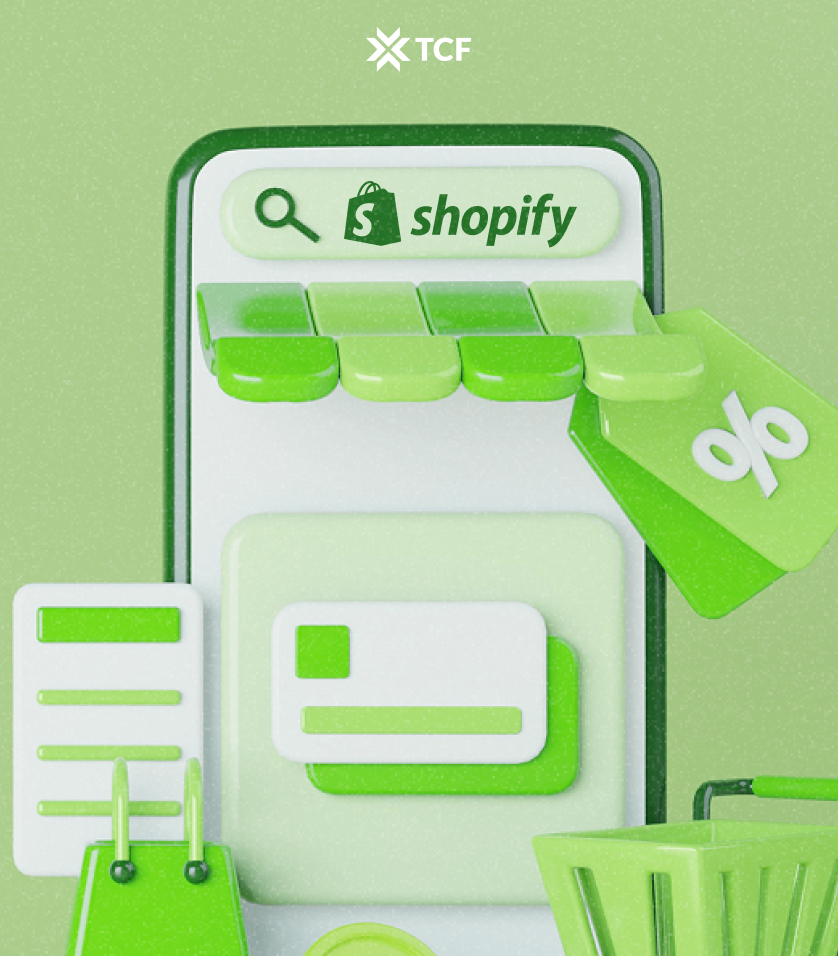
.jpg)
